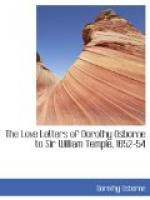SIR,—You would have me say something of my coming. Alas! how fain I would have something to say, but I know no more than you saw in that letter I sent you. How willingly would I tell you anything that I thought would please you; but I confess I do not like to give uncertain hopes, because I do not care to receive them. And I thought there was no need of saying I would be sure to take the first occasion, and that I waited with impatience for it, because I hoped you had believed all that already; and so you do, I am sure. Say what you will, you cannot but know my heart enough to be assured that I wish myself with you, for my own sake as well as yours. ’Tis rather that you love to hear me say it often, than that you doubt it; for I am no dissembler. I could not cry for a husband that were indifferent to me (like your cousin); no, nor for a husband that I loved neither. I think ’twould break my heart sooner than make me shed a tear. ’Tis ordinary griefs that make me weep. In earnest, you cannot imagine how often I have been told that I had too much franchise in my humour, and that ’twas a point of good breeding to disguise handsomely; but I answered still for myself, that ’twas not to be expected I should be exactly bred, that had never seen a Court since I was capable of anything. Yet I know so much,—that my Lady Carlisle would take it very ill if you should not let her get the point of honour; ’tis all she aims at, to go beyond everybody in compliment. But are you not afraid of giving me a strong vanity with telling me I write better than the most extraordinary person in the world? If I had not the sense to understand that the reason why you like my letters better is only because they are kinder than hers, such a word might have undone me.
But my Lady Isabella, that speaks, and looks, and sings, and plays, and all so prettily, why cannot I say that she is free from faults as her sister believes her? No; I am afraid she is not, and sorry that those she has are so generally known. My brother did not bring them for an example; but I did, and made him confess she had better have married a beggar than that beast with all his estate. She cannot be excused; but certainly they run a strange hazard that have such husbands as makes them think they cannot be more undone, whatever course they take. Oh, ’tis ten thousand pities! I remember she was the first woman that ever I took notice of for extremely handsome; and, in earnest, she was then the loveliest lady that could be looked on, I think. But what should she do with beauty now? Were I as she, I should hide myself from all the world; I should think all people that looked on me read it in my face and despised me in their hearts; and at the same time they made me a leg, or spoke civilly to me, I should believe they did not think I deserved their respect. I’ll tell you who he urged for an example though, my Lord Pembroke and my Lady, who, they say, are upon parting after all his passion




